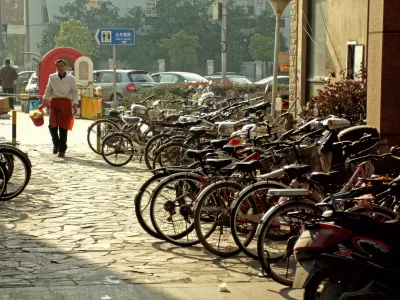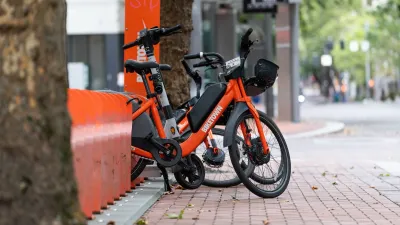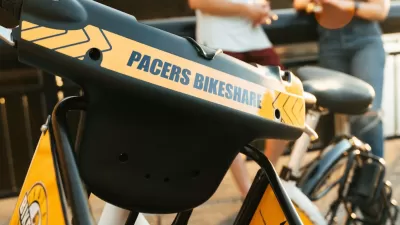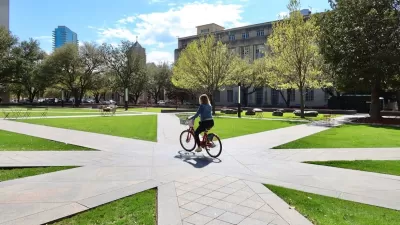Multiple bikesharing companies have put 280,000 bikes on Shanghai's streets, but many are parked in random locations or left unusable on city sidewalks.

Shanghai is suffering from too much of a good thing, it seems. Andy Boreham writes in Shanghai Daily that the city is currently experiencing bikesharing mayhem, with bikes from multiple competing bikeshare companies left parked on the streets in various states of disrepair. Bik share users have also been parking their rides randomly around metro stations, making it sometimes "impossible to find a gap through which to enter the station..."
The problem has come in the form of clogged streets, littered with lines and lines and lines of haphazardly placed rental bikes — some operational, some not — in every color of the rainbow. It’s not pretty, and it’s not functional.
Most of these bikes move like a tidal wave on a daily basis, where they go from drenching suburban streets in the evening after work, to literally flooding Metro stations in the morning where they are left for the entire day.
Boreham notes that the number of bikeshares on the street is expected to climb to 500,000 this year, forcing the Shanghai government to begin tackling the issue of better enforcement and regulation. Among other new regulations will be a requirement that bikeshare companies remove broken or abandoned bikes from the street within 48 hours.
FULL STORY: Jump in rental bikes is proving to be more of a nuisance than a boon

Study: Maui’s Plan to Convert Vacation Rentals to Long-Term Housing Could Cause Nearly $1 Billion Economic Loss
The plan would reduce visitor accommodation by 25,% resulting in 1,900 jobs lost.

North Texas Transit Leaders Tout Benefits of TOD for Growing Region
At a summit focused on transit-oriented development, policymakers discussed how North Texas’ expanded light rail system can serve as a tool for economic growth.

Why Should We Subsidize Public Transportation?
Many public transit agencies face financial stress due to rising costs, declining fare revenue, and declining subsidies. Transit advocates must provide a strong business case for increasing public transit funding.

How to Make US Trains Faster
Changes to boarding platforms and a switch to electric trains could improve U.S. passenger rail service without the added cost of high-speed rail.

Columbia’s Revitalized ‘Loop’ Is a Hub for Local Entrepreneurs
A focus on small businesses is helping a commercial corridor in Columbia, Missouri thrive.

Invasive Insect Threatens Minnesota’s Ash Forests
The Emerald Ash Borer is a rapidly spreading invasive pest threatening Minnesota’s ash trees, and homeowners are encouraged to plant diverse replacement species, avoid moving ash firewood, and monitor for signs of infestation.
Urban Design for Planners 1: Software Tools
This six-course series explores essential urban design concepts using open source software and equips planners with the tools they need to participate fully in the urban design process.
Planning for Universal Design
Learn the tools for implementing Universal Design in planning regulations.
City of Santa Clarita
Ascent Environmental
Institute for Housing and Urban Development Studies (IHS)
City of Grandview
Harvard GSD Executive Education
Toledo-Lucas County Plan Commissions
Salt Lake City
NYU Wagner Graduate School of Public Service





























